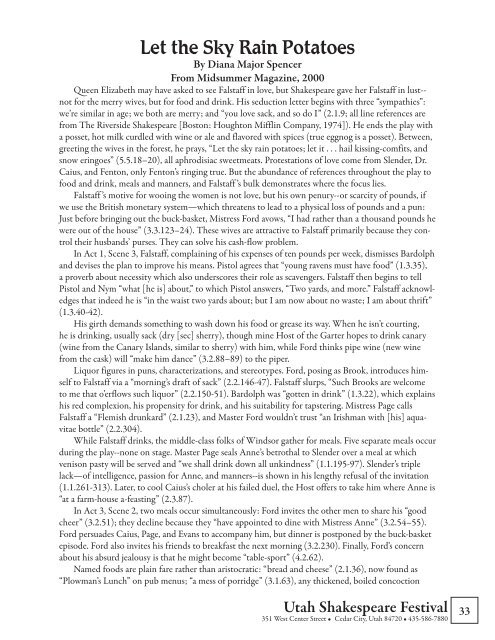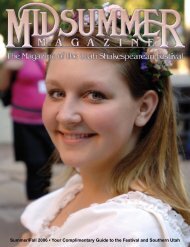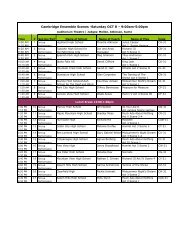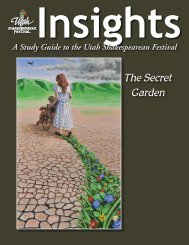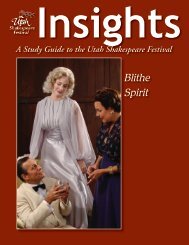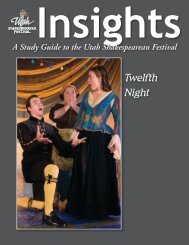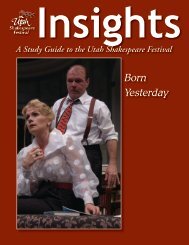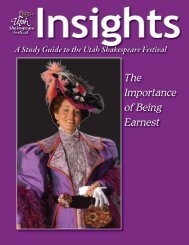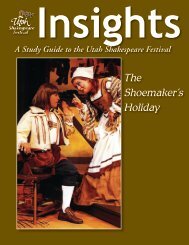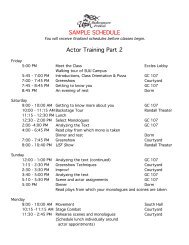View and print the complete guide in a pdf file. - Utah ...
View and print the complete guide in a pdf file. - Utah ...
View and print the complete guide in a pdf file. - Utah ...
Create successful ePaper yourself
Turn your PDF publications into a flip-book with our unique Google optimized e-Paper software.
Let <strong>the</strong> Sky Ra<strong>in</strong> PotatoesBy Diana Major SpencerFrom Midsummer Magaz<strong>in</strong>e, 2000Queen Elizabeth may have asked to see Falstaff <strong>in</strong> love, but Shakespeare gave her Falstaff <strong>in</strong> lust--not for <strong>the</strong> merry wives, but for food <strong>and</strong> dr<strong>in</strong>k. His seduction letter beg<strong>in</strong>s with three “sympathies”:we’re similar <strong>in</strong> age; we both are merry; <strong>and</strong> “you love sack, <strong>and</strong> so do I” (2.1.9; all l<strong>in</strong>e references arefrom The Riverside Shakespeare [Boston: Houghton Miffl<strong>in</strong> Company, 1974]). He ends <strong>the</strong> play witha posset, hot milk curdled with w<strong>in</strong>e or ale <strong>and</strong> flavored with spices (true eggnog is a posset). Between,greet<strong>in</strong>g <strong>the</strong> wives <strong>in</strong> <strong>the</strong> forest, he prays, “Let <strong>the</strong> sky ra<strong>in</strong> potatoes; let it . . . hail kiss<strong>in</strong>g-comfits, <strong>and</strong>snow er<strong>in</strong>goes” (5.5.18–20), all aphrodisiac sweetmeats. Protestations of love come from Slender, Dr.Caius, <strong>and</strong> Fenton, only Fenton’s r<strong>in</strong>g<strong>in</strong>g true. But <strong>the</strong> abundance of references throughout <strong>the</strong> play tofood <strong>and</strong> dr<strong>in</strong>k, meals <strong>and</strong> manners, <strong>and</strong> Falstaff ’s bulk demonstrates where <strong>the</strong> focus lies.Falstaff ’s motive for woo<strong>in</strong>g <strong>the</strong> women is not love, but his own penury--or scarcity of pounds, ifwe use <strong>the</strong> British monetary system—which threatens to lead to a physical loss of pounds <strong>and</strong> a pun:Just before br<strong>in</strong>g<strong>in</strong>g out <strong>the</strong> buck-basket, Mistress Ford avows, “I had ra<strong>the</strong>r than a thous<strong>and</strong> pounds hewere out of <strong>the</strong> house” (3.3.123–24). These wives are attractive to Falstaff primarily because <strong>the</strong>y control<strong>the</strong>ir husb<strong>and</strong>s’ purses. They can solve his cash-flow problem.In Act 1, Scene 3, Falstaff, compla<strong>in</strong><strong>in</strong>g of his expenses of ten pounds per week, dismisses Bardolph<strong>and</strong> devises <strong>the</strong> plan to improve his means. Pistol agrees that “young ravens must have food” (1.3.35),a proverb about necessity which also underscores <strong>the</strong>ir role as scavengers. Falstaff <strong>the</strong>n beg<strong>in</strong>s to tellPistol <strong>and</strong> Nym “what [he is] about,” to which Pistol answers, “Two yards, <strong>and</strong> more.” Falstaff acknowledgesthat <strong>in</strong>deed he is “<strong>in</strong> <strong>the</strong> waist two yards about; but I am now about no waste; I am about thrift”(1.3.40-42).His girth dem<strong>and</strong>s someth<strong>in</strong>g to wash down his food or grease its way. When he isn’t court<strong>in</strong>g,he is dr<strong>in</strong>k<strong>in</strong>g, usually sack (dry [sec] sherry), though m<strong>in</strong>e Host of <strong>the</strong> Garter hopes to dr<strong>in</strong>k canary(w<strong>in</strong>e from <strong>the</strong> Canary Isl<strong>and</strong>s, similar to sherry) with him, while Ford th<strong>in</strong>ks pipe w<strong>in</strong>e (new w<strong>in</strong>efrom <strong>the</strong> cask) will “make him dance” (3.2.88–89) to <strong>the</strong> piper.Liquor figures <strong>in</strong> puns, characterizations, <strong>and</strong> stereotypes. Ford, pos<strong>in</strong>g as Brook, <strong>in</strong>troduces himselfto Falstaff via a “morn<strong>in</strong>g’s draft of sack” (2.2.146-47). Falstaff slurps, “Such Brooks are welcometo me that o’erflows such liquor” (2.2.150-51). Bardolph was “gotten <strong>in</strong> dr<strong>in</strong>k” (1.3.22), which expla<strong>in</strong>shis red complexion, his propensity for dr<strong>in</strong>k, <strong>and</strong> his suitability for tapster<strong>in</strong>g. Mistress Page callsFalstaff a “Flemish drunkard” (2.1.23), <strong>and</strong> Master Ford wouldn’t trust “an Irishman with [his] aquavitaebottle” (2.2.304).While Falstaff dr<strong>in</strong>ks, <strong>the</strong> middle-class folks of W<strong>in</strong>dsor ga<strong>the</strong>r for meals. Five separate meals occurdur<strong>in</strong>g <strong>the</strong> play--none on stage. Master Page seals Anne’s betrothal to Slender over a meal at whichvenison pasty will be served <strong>and</strong> “we shall dr<strong>in</strong>k down all unk<strong>in</strong>dness” (1.1.195-97). Slender’s triplelack—of <strong>in</strong>telligence, passion for Anne, <strong>and</strong> manners--is shown <strong>in</strong> his lengthy refusal of <strong>the</strong> <strong>in</strong>vitation(1.1.261-313). Later, to cool Caius’s choler at his failed duel, <strong>the</strong> Host offers to take him where Anne is“at a farm-house a-feast<strong>in</strong>g” (2.3.87).In Act 3, Scene 2, two meals occur simultaneously: Ford <strong>in</strong>vites <strong>the</strong> o<strong>the</strong>r men to share his “goodcheer” (3.2.51); <strong>the</strong>y decl<strong>in</strong>e because <strong>the</strong>y “have appo<strong>in</strong>ted to d<strong>in</strong>e with Mistress Anne” (3.2.54–55).Ford persuades Caius, Page, <strong>and</strong> Evans to accompany him, but d<strong>in</strong>ner is postponed by <strong>the</strong> buck-basketepisode. Ford also <strong>in</strong>vites his friends to breakfast <strong>the</strong> next morn<strong>in</strong>g (3.2.230). F<strong>in</strong>ally, Ford’s concernabout his absurd jealousy is that he might become “table-sport” (4.2.62).Named foods are pla<strong>in</strong> fare ra<strong>the</strong>r than aristocratic: “bread <strong>and</strong> cheese” (2.1.36), now found as“Plowman’s Lunch” on pub menus; “a mess of porridge” (3.1.63), any thickened, boiled concoction<strong>Utah</strong> Shakespeare Festival351 West Center Street • Cedar City, <strong>Utah</strong> 84720 • 435-586-788033


